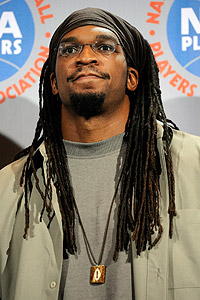 NBA Lockout Ends and Players Get Played
NBA Lockout Ends and Players Get Played
By Dave Zirin
November 28, 2011
There were those bitter adversaries, NBA Commissioner David Stern and National Basketball Players Association Executive Director Billy Hunter, grinning ear-to-ear, discarding their suit jackets and wearing bunchy, seasonal sweaters from the Heathcliff Huxtable collection. Stern was smiling so wide, it appeared that if you poked his middle, he’d giggle like he was Poppin’ Fresh. Hunter, no doubt feeling relieved that he at least fought off a “hard cap” and other demands from ownership, was clearly in the holiday spirit as well. Only NBPA President and LA Lakers Co-captain Derek Fisher, wearing a suit, not a sweater, his eyes bleary from the marathon bargaining session, resembled someone who’d just endured one of the more bitter sports/labor negotiations in history. He looked like he’d just emerged from a Turkish prison.
Judging by facial expressions alone, I’m going to stand with Fisher on this one. Forget the cuddly sweaters. Ignore President Obama’s personal “good deal” thumbs up. Disregard the avalanche of tweets from your favorite star player about how excited they are to get back to work. The players were dunked on and Stern is wagging his tongue while hanging from the rim. If you ignore the bells and whistles and wipe away the confetti, we have what at the bottom line is a massive transfer of wealth from players to owners: $3 billion over the next decade, to be more precise. Three billion dollars extracted from those we pay to see, to those who have spent the last twenty years treating fans and taxpayers like the cowering abused partners we are.
This deal is just all so very pre–Occupy Wall Street. I wish more players had spoken out and not let David Stern’s PR machine define them as “greedy millionaires, insensitive to the public’s suffering in these hard economic times.” I wish more had directly raised the issues of Occupy Wall Street, like eleven-year veteran Etan Thomas, who wrote, “While the issues raised by the Wall Street occupiers differ from the issues of this lockout, aren’t there obvious parallels in power imbalance? Who is in the same position of power as the 1%? Who wants a bailout for their own mismanagement decisions? Who is more closely aligned with the corporate interests from which the Wall Street occupiers are looking to reclaim the country?”
I wish they had taken their fight out of the boardroom and into the public sphere. Make no mistake, I’m an NBA junkie and I’m thrilled to be watching ball sooner rather than later. But with every game of this warped, bastardized sixty-six-game season, I’ll remember that we had a lockout where the rich got richer, the players got played and the fans didn’t get a damn thing.
Read the full article at:
http://www.thenation.com/blog/164822/nba-lockout-ends-and-players-get-played?rel=emailNation-------------------------------------------
NBA Labor Negotiations
By Etan Thomas
Etan Thomas is an 11-year NBA veteran and, as the executive first vice president of the National Basketball Players Association, is an active member of the players' negotiating team.
Special to ESPN.com
November 12, 2011If Occupy the NBA were to happen, would the occupiers see the NBA CEOs as the 1 percent who want to impose their corporate greed, power and will on their employees? While the issues raised by the Wall Street occupiers differ from the issues of this lockout, aren't there obvious parallels in power imbalance?
During the lockout of 1998, Michael Jordan famously said to Wizards CEO Abe Pollin "If you can't make a profit, you should sell your team." That was then and this is now. Why do people have difficulty understanding that he is no longer a player but currently joined at the hip with the rest of the CEOs of the NBA, who -- like Bank of America, Wall Street and the rest of the 1 percent -- not only want but expect a bailout for their own actions?
During the NFL's lockout, Troy Polamalu said, "I think what the players are fighting for is something bigger. A lot of people think it's millionaires versus billionaires and that's the huge argument. The fact is, it's people fighting against big business. The big business argument is, 'I got the money and I got the power, therefore, I can tell you what to do.' That's life everywhere. Isn't it interesting how the common theme here is power and greed?If your boss came to you and said, "Listen, I know we are coming off of record overall profits as far as overall revenue and the most lucrative year in history but we have made some individual decisions that we are not happy with and we need you to take massive pay cuts. We need you to agree to construct the rules so that we can no longer make those mistakes, and we want you to make it easier for us to get rid of you if we choose." What would your reaction be? Would you say "Some money is better than no money," or would you gather the rest of your fellow employees and stand up for yourselves?
 ETAN THOMAS
ETAN THOMASRead the full article at:
http://espn.go.com/espn/commentary/story/_/id/7223340/etan-thomas-questions-nba-labor-negotiations